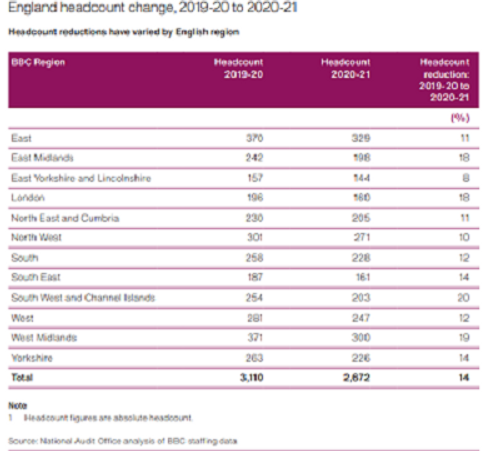Further cuts could “cost us the BBC we love”
The government-imposed saving of £1bn this year is already leading to more repeats and further cuts are planned for next year.
The prospect of another year of cuts at the BBC “will slowly destroy the BBC that we all love" the NUJ has said as a report revealed more repeats, cuts in news and significant redundancies.
The National Audit Office (NAO) report revealed a 22 per cent increase in repeats on BBC 1, due to cuts and Covid and a 12 per cent real-terms reduction in BBC content spending between 2016-17 and 2020-21. The BBC has made annual savings of 1bn with a forecast of £971m to be made in the next year. The BBC expects that increased commercial returns will make a relatively small contribution to its future savings.
As the corporation waits for the government’s decision on the 2022-23 licence fee deal, the NAO said cost pressures were heightened by the high level of inflation in the television and film industry and after year-on-year cuts the BBC estimated that 41 per cent of its annual savings would come “from cuts to content and the scope of services, and 11 per cent from changes to the scheduling mix”. The report said the outcome of the licence fee negotiations could significantly increase the savings it will need to deliver.
“The BBC spent almost £180 million on making over 1,800 staff redundant when delivering savings between 2017-18 and 2020-21. Despite this, the overall number of BBC staff fell by less than 1 per cent between 2016-17 and 2020-21, mainly due to the recruitment of over 1,100 staff as part of a Foreign, Commonwealth and Development Office-funded expansion of BBC World Service,” the report said.
The NAO criticised the BBC’s delivery of savings, saying that reductions to staffing in the English regions led to the temporary suspension of local breakfast news bulletins during summer 2021 when a high number of staff were absent. The corporation also failed to monitor the impact of specific saving measures.
Paul Siegert, NUJ national broadcasting organiser, said:
“The National Audit Office report is worrying on many different levels. It is clear the BBC is in for difficult time and is facing yet more cuts in the coming year.
"This makes the need for a good licence fee settlement even more important. Anything less than an increase linked to inflation would be potentially disastrous and would mean cuts to services across online, radio and TV. The BBC has shown its worth again and again during the pandemic but if it isn’t probably funded it will die a slow death.
"It is not a wasteful organisation and has cut a billion pounds from its budget already but to expect yet more cuts on top of those is unrealistic and will slowly destroy the BBC that we all love."
Gareth Davies, the head of the NAO, said:
“Over the past decade the BBC has consistently made savings and is largely on course to achieve its £1 billion annual savings target by 2021-22. However, over the coming years it will need to make significant further savings at the same time as addressing a range of other challenges, not least its declining audience share. The BBC must ensure its savings plans do not further erode its position with audiences.”
Meg Hillier, the chair of the public accounts select committee warned the BBC that yet more people will jump ship and choose not to pay the licence fee if cannot maintain the quality of its offering.
The report said the BBC’s News division reduced or cancelled some of its services in order to make savings. The Andrew Neil Show was cut, Newsnight’s budget was reduced as was coverage of Parliament. Despite such reductions, the number of actual television content hours produced by the division increased by 4 per cent between 2017-18 and 2020-21 from 4,689 to 4,876 hours, reflecting, in part, an increase in live coverage during the COVID-19 pandemic.
It made significant redundancies, with 520 permanent post closures announced in July 2020, about 9 per cent of its workforce. Of the post closures to date, 35 per cent have been frontline journalist roles. This has led to poor morale in the News division.

